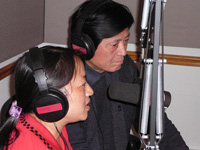




Wu Chuntao was born in the southern Chinese province of Hunan in 1963. She has co-authored with her husband, Chen Guidi, The Situation of China’s Peasants , which shook the urban middle classes of China and exposed the massive corruption and hardship faced by the country’s 900 million peasants. She spoke to fellow investigative journalist Bai Fan, of RFA’s Mandarin service, about what moved her to start her award-winning work with Chen:
“There are 900 million peasants in China. But they don’t have their own newspaper—they don’t have their own TV station. They don’t have their own organizations. They are vulnerable, and without a voice.”
“One of the things that really struck me every time was that whenever we were out doing investigations, if we helped them to do some small thing, or if they had a request, they would always kneel to thank us. I used to cry seeing them kneel like that. Once even an old man of 80 got down on his knees to me. I used to wonder how it was that Chinese people were so spineless. But then I realized they have no other way of dealing with problems. What else do they have, other than to kneel? They are truly helpless. Who is going to help their voices be heard, to give voice to their concerns?”
“I decided I was going to have to produce this work—there was a tremendous force behind this desire. I had been wanting to write about the countryside for more than a decade, but I hadn’t done anything about it. Back in 2002, when I was about to give birth, I was quite old for my first child, at 36, and I had pre-eclampsia, high blood pressure, a condition that leads to many deaths in childbirth, and I had to go to the hospital for observation when I was about six months pregnant. I remember that it was dumpling festival ( yuanxiao ) and I heard the sound of someone crying really loudly. It was a man, and I thought, ‘Oh no, a woman must have died in childbirth.’ So I asked the nurse, and she told me that the woman had the same condition as me, only not quite as bad, and she had come to the hospital and they had asked her to pay a deposit of 3,000 yuan (U.S. $390).”
“Now, in the countryside it is common knowledge that it only costs about 100 (U.S. $13) or 200 yuan to have a baby. So the woman thought the doctor was cheating her, or she didn’t want to pay that much money, and anyway she really didn’t have the money. So she said to her husband, let’s go back home. This was to a hill village about 10 kms (6.2 miles) away over steep mountain roads. And the day after she got back she started bleeding, and she called the midwife but she told her not to worry, that childbirth always meant blood. It wasn’t until she had been bleeding for hours and had already lost consciousness, and the baby still wasn’t born, that the midwife got her act together and took her to the hospital.”
“The woman died on the way, but they came to the hospital anyway, and the doctors weren’t going to deliver her because she was already dead. He was crying that for 3,000 yuan he could have saved two lives, that if he’d known he would have sold their house to make things right, that it had all happened for the sake of 3,000 yuan. That woman was only 28 years old.”
“When I heard that, it had a very strong effect on me, and I started having nightmares, because if my mother hadn’t pressed my father into moving to the city and if she hadn’t got an urban household registration document after he died then that would have been me, and I would definitely have died because my condition was even worse than hers was. To give birth in the countryside means you die. Those women really have it tough.”
“I realized then that I can put pen to paper—that is my particular gift. I happen to have these skills, this ability. Of course I am going to use it to get their voices heard, and to make everyone else care about what happens to them. So my baby was born and I thought that at the same time I would give birth to another baby. I left him with a neighbor and began working on the investigations.”
“We have made a decision to concentrate on writing about the countryside for at least the next five years. We are probably not going back to Anhui, but we will continue to write about China’s rural communities in other places all around the countryside.”
“We will be looking for continuing problems among farmers, and for their solutions; what the farming communities are doing to address these problems. We expect to go to a few of the inland Western provinces. If we can get the material we need we would expect to produce this book by next year.”
The English-language edition of their book is published in the United States in May 2007 by Public Affairs Books, under the title Will the Boat Sink the Water? The Life of China’s Peasants .
Original reporting in Mandarin by Bai Fan. RFA Mandarin service director: Jennifer Chou. Translated and produced for the Web in English by Luisetta Mudie. Edited by Sarah Jackson-Han.
Please continue to send contributions to RFA’s Women in Their Own Words project to this address: women@rfa.org